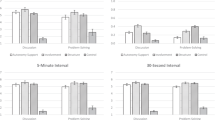Abstract
Child behavior ratings were made by 17 mothers and fathers of the same child. Agreement was computed for each parent pair under the following experimental conditions: (1) Ratings of their own child's behavior in general (CBC); (2) ratings of own child based on observations of him/her in a videotaped sample; (3) ratings of an unknown child based on observations of him/her in a videotaped sample; and (4) ratings of the videotaped sample of own child and unknown child using a one minute time-sampling procedure. Parents achieved higher rates of agreement (X=.81) than have previously been reported. Increasing the specificity of the behavior being rated did not significantly affect agreement. Those parent pairs who agreed the most did not necessarily spend a large amount of time in the same kind of situations with their child. Agreement was significantly greater when parents rated their own children's videotaped behavior sample as opposed to that of an unknown child.
Similar content being viewed by others
References
Becker, W. C. The matching of behavior rating and questionnaire personality factors.Psychological Bulletin, 1960,57, 201–212.
Ferguson, L. R., Partyka, L. B., & Lester, B. M. Patterns of parent perception differentiating clinic from nonclinic children.Journal of Abnormal Child Psychology, 1974,2, 169–181.
Miller, L. Q-sort agreement among observers of children.American Journal of Orthopsychiatry, 1964,34, 71–75.
Novick, J., Rosenfeld, E., & Block, D. A. Situational variation in the behavior of children,Journal of Consulting Psychology, 1966,30, 488–493.
Simeon, J., Coffin, C., & Marasa, J. Videotape techniques in pediatric psychopharmacology research. In D. U. Siva Sankar (Ed.),Psychopharmacology of childhood. Westburg, New York: PJD Publications Ltd., 1976.
Speer, D. C. Behavior problem checklist (Peterson-Quay): Base-line data from parents of child guidance and nonclinic children.Journal of Consulting and Clinical Psychology, 1971,36, 221–228.
Walker, R. N. A scale for parent's rating; Some ipsative and normative correlations.Genetic Psychology Monographs. 1968,77, 95–133.
Walters, J., Pearce, D., & Dahms, L. Affectional and aggressive behavior of preschool children.Child Development. 1957,28, 15–26.
Author information
Authors and Affiliations
Rights and permissions
About this article
Cite this article
Burrows, K.R., Kelley, C.K. Parental interrater reliability as a function of situational specificity and familiarity of target child. J Abnorm Child Psychol 11, 41–47 (1983). https://doi.org/10.1007/BF00912176
Revised:
Issue Date:
DOI: https://doi.org/10.1007/BF00912176




